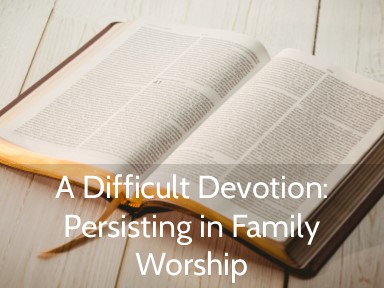Rockbridge Academy Blog
A Difficult Devotion

Family, worship. Two words, each of which standing alone is richly warm and evocative. “Family” connotes community, belonging, and love. “Worship” conjures thoughts of reverence, jubilation, and communion. However, curiously (and sadly), when these two precious terms are conjoined into a single phrase (family worship), the associated words that come most immediately to mind are “boring” and “bland.”
Having lead family worship in our home for nearly thirty years with reasonable consistency and intentionality, I must confess that it is not one of my more successful endeavors. Although I have not had the courage to poll them, I suspect that “boring” and “bland” might summarize my children’s collective assessment. Nevertheless, by grace, my wife Deni, and I have persevered through the years clinging to the conviction that, in conducting family worship in some form on a regular basis, we are about a noble business the ultimate success of which is not only determined by God but is best left to Him to measure as well.
At our house, family worship has taken on many different forms over the years, but almost always it has consisted of three essential elements: God’s word, prayer, and singing.
1) The Scriptural Component—For many years, we used a family worship card distributed by our church that listed daily Bible readings designed to prepare us for the upcoming Sunday’s sermon. At other times, I have simply read a Psalm or other short passage. More recently, I have used a daily reading from a devotional book such as (a) My Utmost for His Highest by Oswald Chambers, (b) C. H. Spurgeon’s Morning and Evening, and (c) Note to Self by Joe Thorn. In the early years, when we had only young children, our Bible readings were “age appropriate.” However, in those middle years when our children’s ages spanned 17 to infancy, I refused to “dumb things down” and stubbornly taught to the eldest level, trusting that the younger ones would glean what they were able and calling on the older children to explain any difficult concepts to their younger siblings.
2) Prayer—The prayer component of our family worship has consisted primarily of thanksgiving and intercession. We collectively identify prayer items, and one or more of us leads in prayer about those particular matters.
3) Singing—Typically, we close our worship with a song, which could be a hymn, a contemporary chorus, or simply the doxology.
Beyond content and format, I have learned that consistency is critical to family worship. As in virtually all other worthwhile endeavors, whether it’s physical fitness or personal devotions, so it is with family worship: much more is gained by small incremental efforts consistently applied over a long time than by lavish outpourings that occur only sporadically. Of course, this does not mean that family worship has occurred in our home every day of every week for the past thirty years. However, it does mean that Deni and I, together, have battled hard alongside our children not to succumb to their apathy, my indolence, or the innumerable distractions presented by our varied schedules.
Consistency also should not suggest rigidity. In fact, consistency over the long haul is fueled by flexibility. For example, adjusting the time that we conduct our family worship to accommodate our schedules has been the saving grace to this daily endeavor. There was a period of a few years during which we shifted family worship from the dinner hour to the breakfast table because it offered a better fit.
If flexibility is the fuel, then brevity is the oil that helps to overcome the frictional forces that grind against consistency. Except for those occasional times when genuine discussion springs forth, our family worship times generally last no more than 5 to 8 minutes. While such brevity imposes limitations, it has been central to preventing family worship from being crowded out by competing demands.
So, why do it? We have persisted in this difficult devotion because it affords our family a corporate opportunity to exalt the wisdom, power, and love of our heavenly Father and to acknowledge our need for the grace of Jesus Christ. It is a propitious moment in the day for all of us—together—to be reminded of the gospel. In this sense, family worship is yet another means of grace, literally empowering us to live our lives in a manner worthy of our high calling.
As such, can it be said that family worship is “bland” or “boring?” If that is my perspective, then it is simply indicative of my need. And that realization should not discourage me to pursue this blessed opportunity as one who is desperate to drink more deeply of God’s precious grace—desperate for me and desperate for my family.
Jay Mitchell currently serves as an elder at Annapolis EP Church. He also served as the chairman of the board of directors for Rockbridge Academy. Jay practices law professionally, but adds his favorite avocation is teaching. He has been married to his wife, Deni, for over 40 years, and they are blessed with eight children (5 of whom are Rockbridge alumni) and 12 grandchildren. This article was originally published in the spring 2013 issue of The Rockbridge Reporter.
